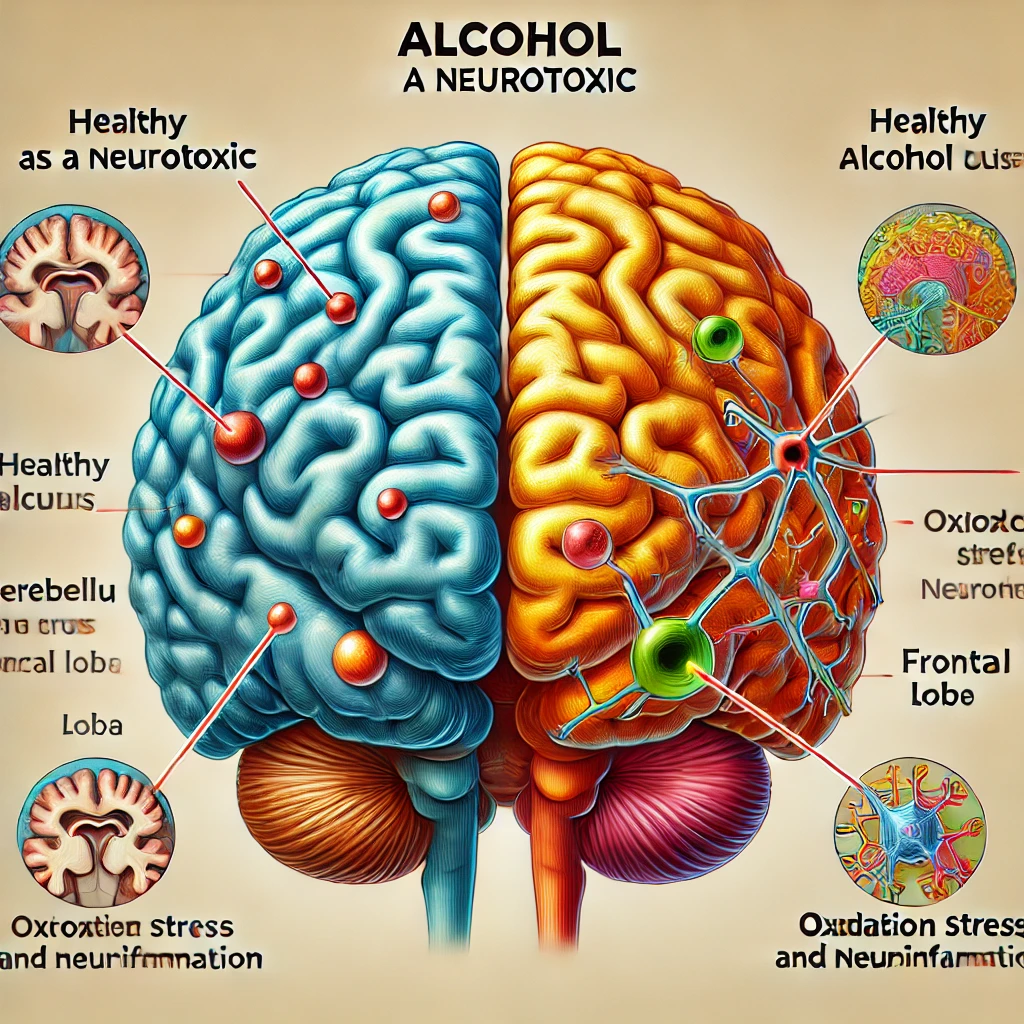Ever found yourself struggling to recall the events of last night after a few too many drinks? It’s not just a momentary lapse—alcohol can act as a stealthy thief, robbing you of precious memories. In this article, we’ll uncover the ways alcohol affects your brain, specifically its role as a neurotoxin and its impact on memory.
The Intricate Brain-Alcohol Connection
Our brains are complex networks of neurons, constantly communicating through electrical impulses and chemical signals. Alcohol disrupts this intricate system.
When consumed, it quickly enters the bloodstream and crosses the blood-brain barrier, directly impacting brain function. This disruption is where the problem begins.
Imagine waking up one day and realizing that your fondest memories are slowly slipping away, not due to aging, but because of that nightly glass of wine or weekend binge. It’s a sobering thought, isn’t it?
Alcohol as a Neurotoxin
A neurotoxin is a substance that damages or destroys nerve tissues. Alcohol, in large quantities, fits this definition perfectly.
Chronic alcohol consumption leads to the deterioration of neurons, the cells responsible for transmitting information throughout your brain and body.

The Hippocampus: Memory’s Gatekeeper
The hippocampus is a small, yet vital part of the brain responsible for forming new memories. Unfortunately, it’s highly susceptible to the effects of alcohol.
Even moderate drinking can interfere with the hippocampus’s ability to create and store new memories.
Consider the hippocampus as the diligent librarian of your mind, cataloging every new experience and storing it for future reference. Alcohol, however, is the unruly guest who turns this orderly system into chaos.
Short-Term Memory Loss
One of the most immediate effects of alcohol consumption is short-term memory loss.
This phenomenon, often referred to as “blackouts,” occurs when alcohol disrupts the activity of neurotransmitters like glutamate. Glutamate plays a crucial role in cognitive functions, including memory formation.
The Science Behind Blackouts
During a blackout, alcohol prevents the brain from forming new long-term memories.
This means that while you might appear to be functioning normally—holding conversations, engaging in activities—your brain is not recording these events for later recall.
Imagine flipping through a photo album of your life, only to find entire pages missing, not because they were never photographed, but because the camera malfunctioned at the worst possible moments.
Long-Term Memory Impairment
The effects of alcohol on memory aren’t limited to short-term disruptions.
Chronic alcohol abuse can lead to long-term memory impairment. This is particularly true for individuals who engage in heavy drinking over extended periods.
Wernicke-Korsakoff Syndrome
Wernicke-Korsakoff Syndrome (WKS) is a severe brain disorder often associated with long-term alcohol abuse. It consists of two stages:
Wernicke’s encephalopathy and Korsakoff’s psychosis.
The former is characterized by acute brain damage, while the latter results in chronic memory problems and confabulation, where the person creates false memories without intending to deceive.
Think of WKS as a storm that ravages a once-thriving library, leaving only tattered books and scattered pages in its wake, forever altering the landscape of your mind’s repository.
The Role of Nutrition
Alcohol doesn’t just affect the brain directly—it also impacts your nutritional intake, further exacerbating memory problems.
Chronic drinkers (You can test if you are drunk with our simple tool here) often suffer from deficiencies in essential vitamins, particularly thiamine (vitamin B1), which is crucial for brain health.
Thiamine Deficiency and Memory
Thiamine plays a significant role in neuronal function and energy metabolism in the brain. A deficiency can lead to neurological problems, including memory loss.
Alcohol impairs the absorption of thiamine, leading to conditions like Wernicke-Korsakoff Syndrome.
Picture your brain as a high-performance engine, reliant on a steady supply of premium fuel (thiamine) to function optimally.
Alcohol, however, acts as a corrosive agent, depleting this essential resource and causing the engine to sputter and fail.
Reversing the Damage
The good news is that the brain has a remarkable ability to heal itself, especially if the damage is caught early. Reducing alcohol intake or abstaining altogether can lead to significant improvements in cognitive function and memory.
Neuroplasticity: The Brain’s Healing Power
Neuroplasticity refers to the brain’s ability to reorganize itself by forming new neural connections. Even after sustained damage from alcohol, the brain can recover to some extent through neuroplasticity.
Engaging in cognitive exercises, maintaining a healthy diet, and ensuring adequate sleep can aid in this recovery process.
Imagine your brain as a forest devastated by fire. While the immediate aftermath is bleak, with time, care, and the right conditions, new growth can emerge, bringing life back to the once-scorched landscape.
Practical Steps to Protect Your Memory
While the occasional drink might not cause lasting damage, it’s essential to recognize the risks of chronic alcohol consumption. Here are some practical steps to protect your memory:
- Limit Alcohol Intake: Moderation is key. Stick to the recommended guidelines to minimize the risk of memory impairment.
- Stay Hydrated: Alcohol dehydrates the body, which can exacerbate its neurotoxic effects. Drink plenty of water to stay hydrated.
- Nutrient-Rich Diet: Ensure your diet is rich in vitamins, especially B vitamins, to support brain health.
- Regular Exercise: Physical activity boosts overall brain function and can help mitigate the effects of alcohol on memory.
- Cognitive Exercises: Engage in activities that challenge your brain, such as puzzles, reading, and learning new skills.
Think of these steps as a shield, fortifying your brain against the silent thief that is alcohol, ensuring that your memories remain intact and your cognitive abilities sharp.
Conclusion
Alcohol’s role as a neurotoxin and its impact on memory is a serious concern. From short-term blackouts to long-term cognitive impairment, the effects are far-reaching.
However, understanding these effects and taking proactive steps can help mitigate the damage and protect your brain.
As you reflect on your relationship with alcohol, consider this: every drink you forgo is a step towards preserving the precious memories that make up the tapestry of your life. Isn’t that worth toasting to?

1 thought on “The Silent Thief: How Alcohol Steals Your Memory”
Comments are closed.